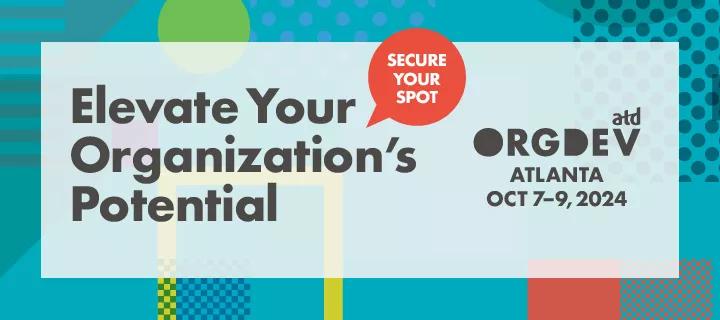ATD Blog
Using the MBTI Assessment With Neurodivergent People
When done correctly, using personality questionnaires as part of individual or team development can have a positive effect for neurodivergent workers.
Tue Aug 06 2024

Bookmark
What is neurodiversity and neurodivergence?
Many people are neurotypical. Their mental functioning aligns with what society sees as typical or “normal.” Others are neurodivergent; they function differently in some way. Often, the word neurodiverse is used as a synonym for neurodivergent, though strictly speaking we are all neurodiverse to some degree; none of us think and function in precisely the same way.
Neurodivergence can take many different forms, including Attention Deficit Hyperactivity Disorder (ADHD), Autistic Spectrum Disorder (ASD), Dyscalculia (a specific and persistent difficulty in understanding numbers), Dyslexia, Dyspraxia (also known as developmental co-ordination disorder, affecting movement, co-ordination and balance), and Tourette’s syndrome. Some authorities also see Obsessive-Compulsive Disorder (OCD) as a form of neurodivergence. Many neurodivergent people have characteristics of more than one of these conditions.
Historically, the medical model has been applied to neurodiversity. People who might now see themselves or be described as neurodivergent were seen as suffering from a medical condition or disorder, or from some form of learning disability, deficit, or impairment. The concept of neurodiversity replaces this with the idea that there is a range of human characteristics, with some people (the neurotypical) closer to the average of these and others (the neurodivergent) further from the average.
Can the MBTI assessment be used with neurodivergent people?
Some advocates have spoken out against the use of personality assessments with neurodivergent people, accusing these tools of “screening out neurodiversity.” However, these criticisms only really apply when personality questionnaires are used as part of screening or at other stages of recruitment (and even in this context other selection tools, such as traditional interviews, can have a more detrimental effect). Using personality questionnaires as part of individual or team development or coaching, the context in which the MBTI assessment is used, should have a positive effect for neurodivergent people. There are several reasons for this, including:
The MBTI approach provides a positive framework for individual differences, and for a neurodivergent person, this recognition of aspects of their personality and behavior can be an extremely positive experience. To quote one participant in our research, MBTI feedback has “allowed me to realize that I’m not an anomaly and that there are others who have similar challenges like I do.”
The MBTI framework can also help non-neurodiverse clients to understand the positive benefits of the ways in which others are different. For example, one specific area where the MBTI assessment is useful is in understanding the value of different work styles.
Using the MBTI assessment in team development helps team members to see the value of other points of view and is likely to reduce groupthink and marginalization. As neurodivergent people have been more likely to be marginalized in this way, MBTI-led team development is likely to be beneficial for them.
Some forms of neurodiversity are characterized in part by difficulty in understanding one’s own behavior, or the behavior of others. The MBTI model can provide a straightforward framework to help with this.
Many neurodivergent people, perhaps especially those in professional or managerial roles, have learned to “mask” their natural behavior, concealing or suppressing aspects of their neurodivergent traits to fit in with the norms of their workplace or of wider society. Just as MBTI feedback helps some clients see (for example) their introversion preference as OK, the discussion can help clients see their neurodiversity as OK, reducing the feelings of isolation and imposter syndrome that some may suffer from.
How to use the MBTI assessment with neurodivergent people
In most circumstances, people are under no obligation to disclose whether or in what way they are neurodivergent. However, most of the steps that a MBTI practitioner might take in using the assessment with a neurodivergent individual will be good advice for using it with any client.
In asking clients to complete the MBTI assessment:
Clearly state the purpose for using the assessment, including exactly how, when, and where the results will be used, and be prepared to answer detailed questions about the process.
When clients are completing the questionnaire online, ensure that there is still a way for them to ask questions and be responded to.
Some people may find some of the questions in the assessment too abstract and ask for a specific context or find it difficult to make a choice. Set up the administration of the assessment carefully, providing clear instructions, and be available to answer questions.
When giving people feedback on their results:
Work through the introduction to the feedback session in a structured, ordered way, laying out exactly what is going to happen and why. Make it clear that the discussion will be confidential and that there is no right or wrong, no better or worse type to be.
Many neurodiverse people will have been on a journey to find out more about themselves and will have taken other type assessments. These may have been free online quizzes that gave questionable results. These clients are likely to be enthusiastic about having MBTI feedback but may have misconceptions about the type and what this says about them. You may need to talk through these misconceptions during the feedback session.
Use pictures as well as words, and avoid the use of very wordy slides or handouts.
Be prepared to adapt questions when needed, such as adding clarification or defining a specific context, and do not continue to persevere with a question that clearly is not working. Avoid giving clients the impression that it is their fault that the question seems difficult to answer, and be aware of “masking” behavior.
Some neurodivergent people have learned to “mask” their natural behavior to fit in with the norms of the workplace or of wider society. This will affect the way in which clients will complete the questionnaire and respond to questions in feedback.
Listen carefully to what your client says and avoid making assumptions. For example, a question that MBTI practitioners often ask in relation to extraversion-introversion is, “How do you typically operate in meetings?” If your client says that they usually don’t contribute a great deal, it may be tempting to assume that they have introversion preferences and move on. Instead, ask why first. It may be, for example, that their contributions are not appreciated or taken seriously, so they have stopped contributing. Or that, as someone with Tourette’s syndrome, then when in a meeting all their energy is taken up with supressing tics. Or that, as someone with ADHD, they find having to sit still in a meeting on an uninteresting topic positively painful. Never assume, always ask why.
You may be asked questions such as “What MBTI type are people with ADHD?” The answer: They can have any one of the 16 types. Type and ADHD are not the same thing, type and autism are not the same thing, and so on.
MBTI feedback can be extremely helpful to neurodivergent people. Here is a final quote: “It was the MBTI assessment that first got me to push for my own diagnosis. There is so much more that I could say here about how powerful the MBTI tool is for helping people with neurodiversity understand themselves and how they can fit into the workplace as themselves and all that they can bring.”


